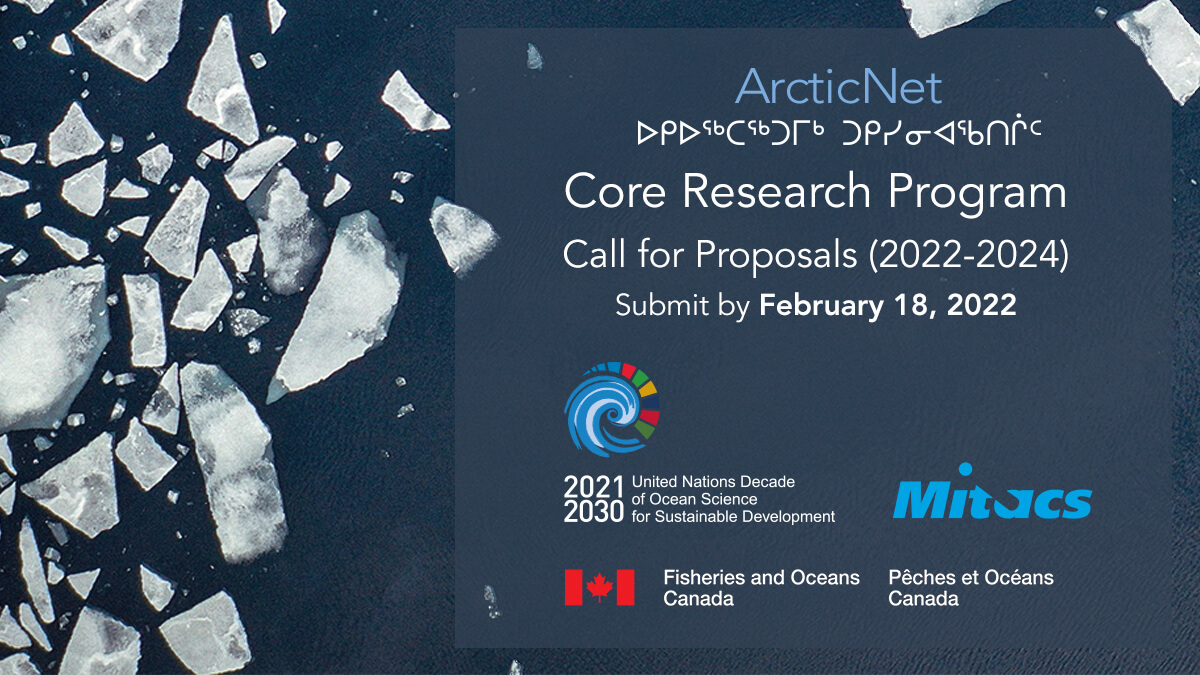ArcticNet, in partnership with UNESCO’s Intergovernmental Oceanographic Commission (IOC) and Mitacs, is issuing this Call for Proposals (CFP) that is partially funded by Fisheries and Oceans Canada (DFO) to initiate new projects that are relevant to the Network’s mandate and that address emerging science priorities that support a self-determined and sustainable Canadian North.
The CFP has been endorsed as a contribution to the United Nations (UN) Decade of Ocean Science for Sustainable Development 2021-2030 (“Ocean Decade”) in recognition of the role it will play in achieving the Ocean Decade’s vision. Marine proposals funded as part of the Call for Proposals (CFP) will be endorsed as Decade Actions and will become part of a highly visible, shared, global effort to advance ocean science by opening up opportunities to create new collaborations across disciplines, geographies and generations, and to establish access to new sources of support.
Applicants must submit their completed proposal by 17:00 EST February 18, 2022.
Scope and Research Priorities
Growth of economic activities in the Arctic, compounded with the ongoing global climate change crisis, has created a suite of new research priorities and needs that must enhance understanding and support decision-making. ArcticNet projects address research gaps and needs identified by end-users, including those defined by Indigenous leaders and communities, national and territorial governments, scientists, and international declarations.
ArcticNet, will fund projects addressing priorities related to human health, natural, and social sciences in the Canadian North. Innovative, multidisciplinary, state-of-the-art and inclusive projects are solicited to address the challenges and opportunities created by the rapidly changing natural environment, and social and cultural systems. Applicants must outline how their work is addressing research gaps and needs identified by end-users.
ArcticNet aims to fund a balanced research portfolio that spans disciplines, geographies, and levels of impact from communities to the global context.
ArcticNet is committed to furthering equity, diversity and inclusion. Applicants are strongly encouraged to review the NCE Equity Statement as well as ArcticNet’s Equity, Diversity and Inclusion (EDI) Strategy and incorporate EDI practices into their project, particularly in the composition of the project team.
For more details see:
- Call for Proposals Guide (PDF)
- Project Tables (Excel)
- Coming soon: “Partnered Access to the North Appendix”
The appendix will be released in January 2022.
Partner Descriptions
IOC – UNESCO
The Intergovernmental Oceanographic Commission of UNESCO (IOC) is the United Nations body responsible for supporting global ocean science and services. The IOC enables its 150 Member States to work together to protect the health of our shared ocean by coordinating programmes in areas such as ocean observations, tsunami warnings and marine spatial planning. Since it was established in 1960, the IOC has provided a focus for all other United Nations bodies that are working to understand and improve the management of our oceans, coasts and marine ecosystems. Today, the IOC is supporting all its Member States to build their scientific and institutional capacity in order to achieve the global goals including the UN Agenda 2030 and its Sustainable Development Goals, the Paris Agreement on Climate Change and the Sendai Framework on Disaster Risk Reduction.
DFO
Fisheries and Oceans Canada (DFO) is a federal institution, responsible for safeguarding the nation’s waters and managing Canada’s fisheries and oceans resources. DFO helps to ensure healthy and sustainable aquatic ecosystems through habitat protection and sound science. DFO supports economic growth in the marine and fisheries sectors, and innovation in areas such as aquaculture and biotechnology.
Mitacs
Mitacs is a national not-for-profit organization with a mandate to increase productivity and economic growth in Canada through innovation. With over 20 years of experience in innovation, Mitacs builds partnerships between government, partner organizations and academia that support industrial social innovation.
The collaboration between Mitacs and ArcticNet will strengthen opportunities for the next generation of Arctic research by creating new pathways for access to talent and fostering critical research, including the impact brought by climate change and modernization in the Arctic region as well as challenges facing the remote and Indigenous communities that call the region home.
Mitacs can provide individual advice (email dphillips@mitacs.ca to schedule a discussion) or applicants can attend an information webinar that will be held on January 13, 2021, 1PM EST.
Webinar Access:
https://mitacs.zoom.us/webinar/register/WN_VXf8325bSmiZPK_yj1Nflg
***
About the Ocean Decade:
Proclaimed in 2017 by the United Nations General Assembly, the UN Decade of Ocean Science for Sustainable Development (2021-2030) (‘the Ocean Decade’) seeks to stimulate ocean science and knowledge generation to reverse the decline of the state of the ocean system and catalyse new opportunities for sustainable development of this massive marine ecosystem. The vision of the Ocean Decade is ‘the science we need for the ocean we want’. The Ocean Decade provides a convening framework for scientists and stakeholders from diverse sectors to develop the scientific knowledge and the partnerships needed to accelerate and harness advances in ocean science to achieve a better understanding of the ocean system, and deliver science-based solutions to achieve the 2030 Agenda. The UN General Assembly mandated UNESCO’s Intergovernmental Oceanographic Commission (IOC) to coordinate the preparations and implementation of the Decade.
